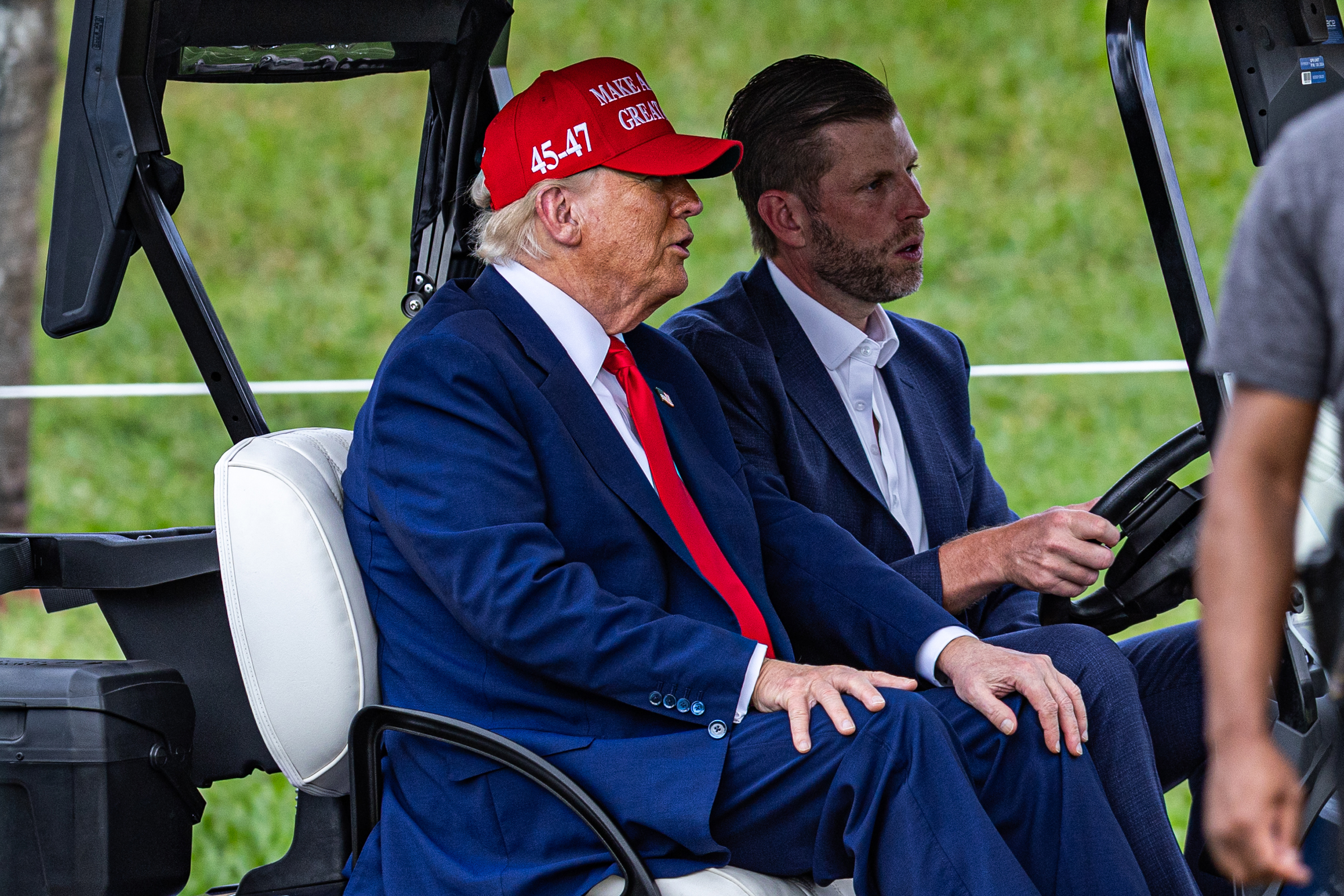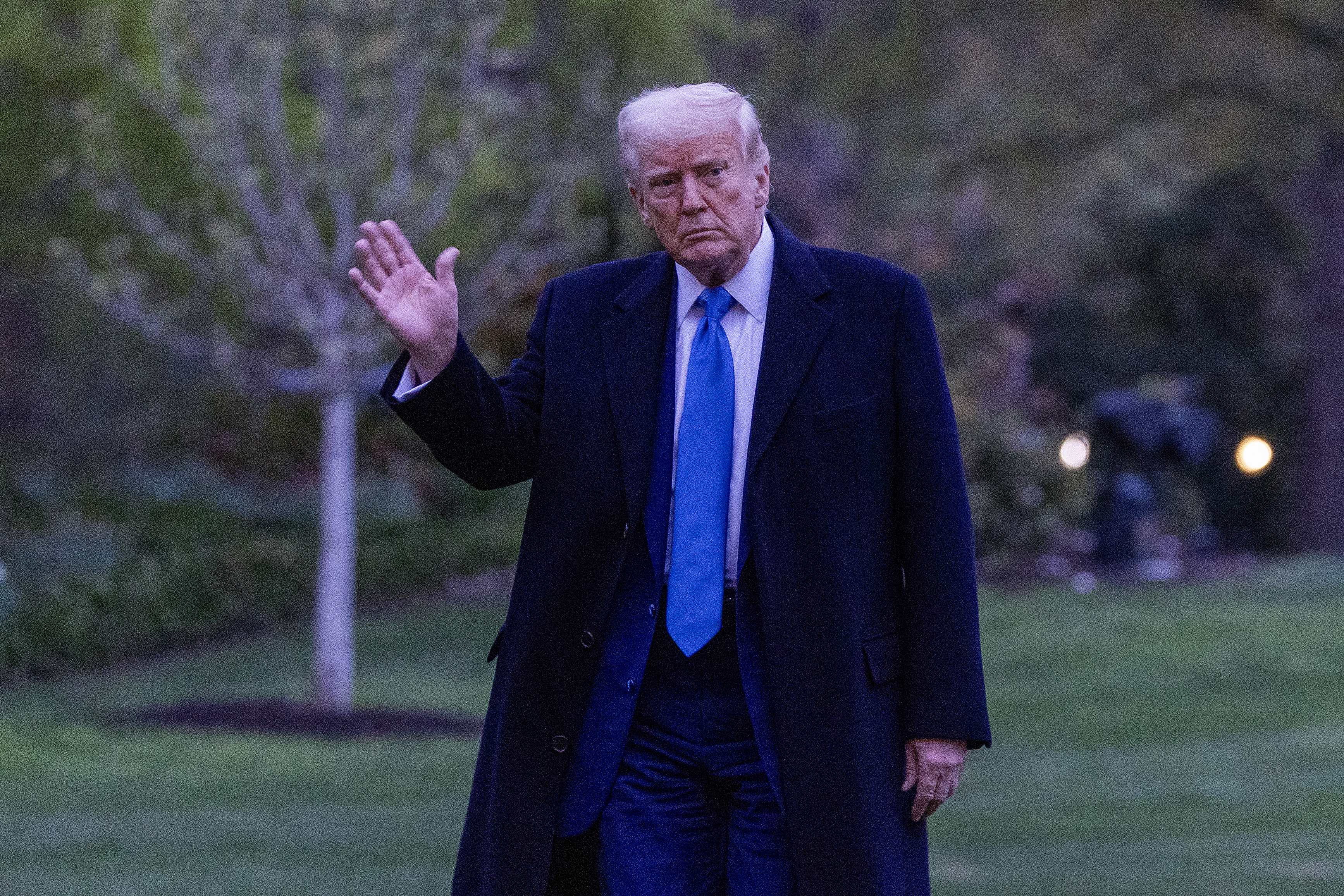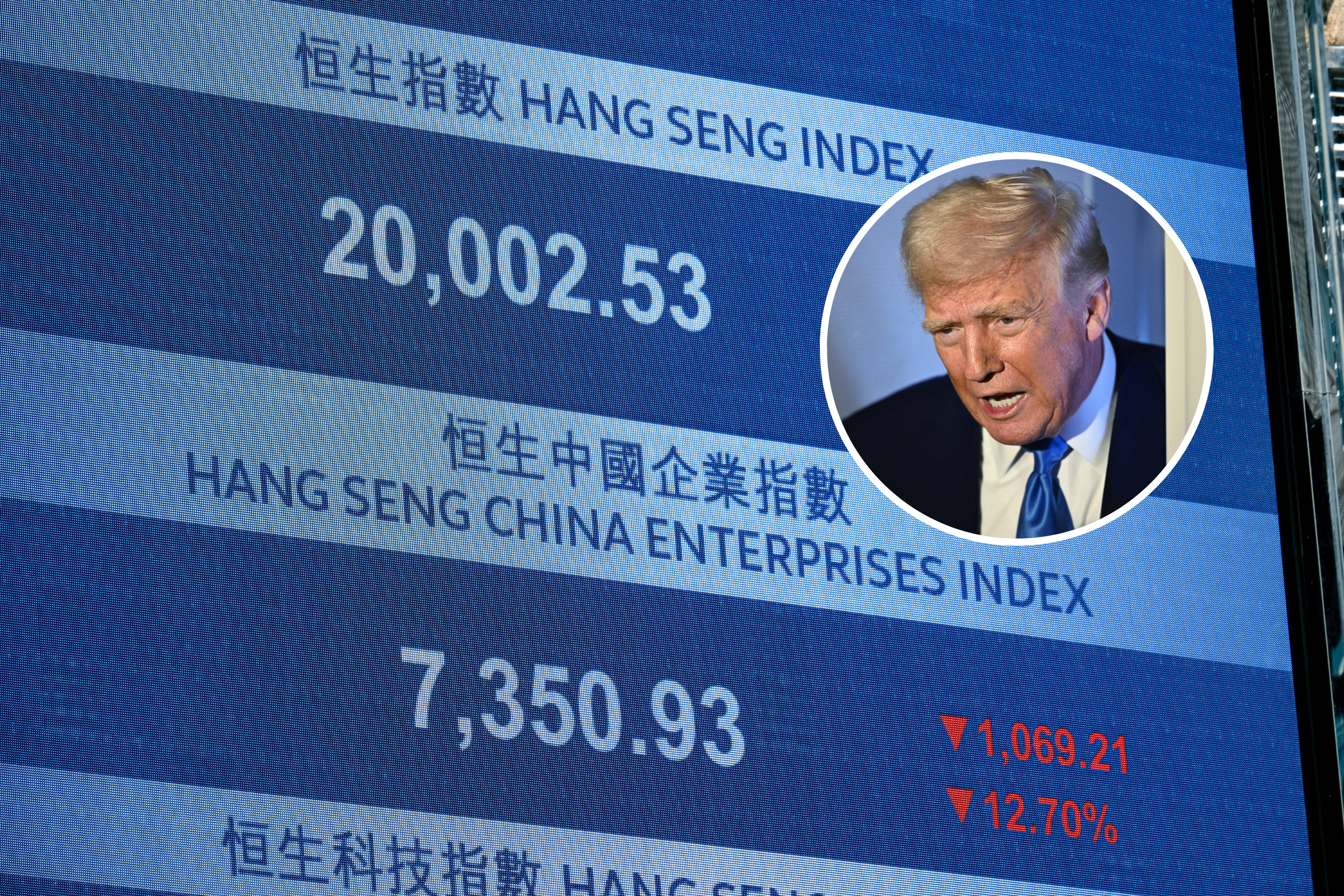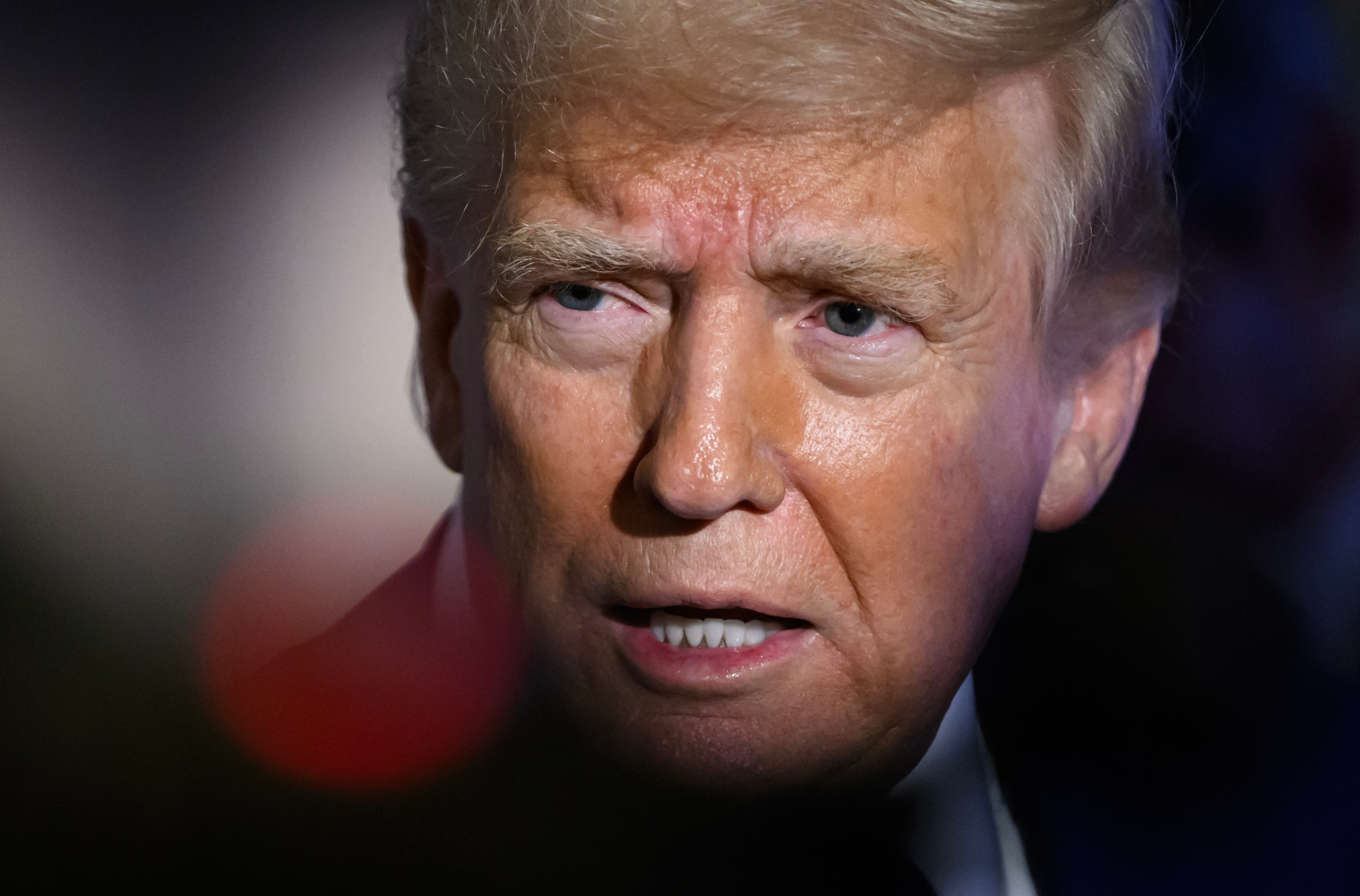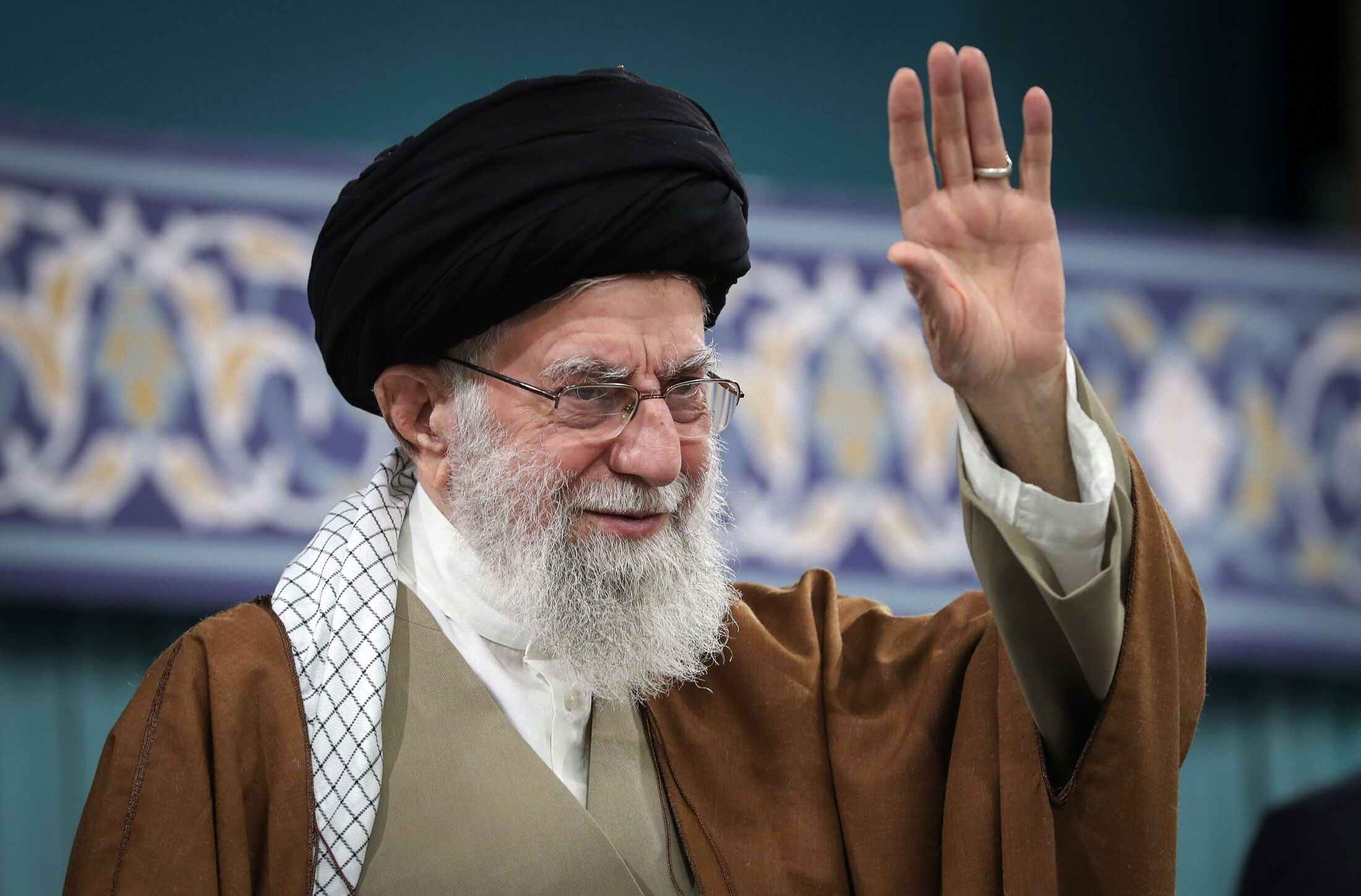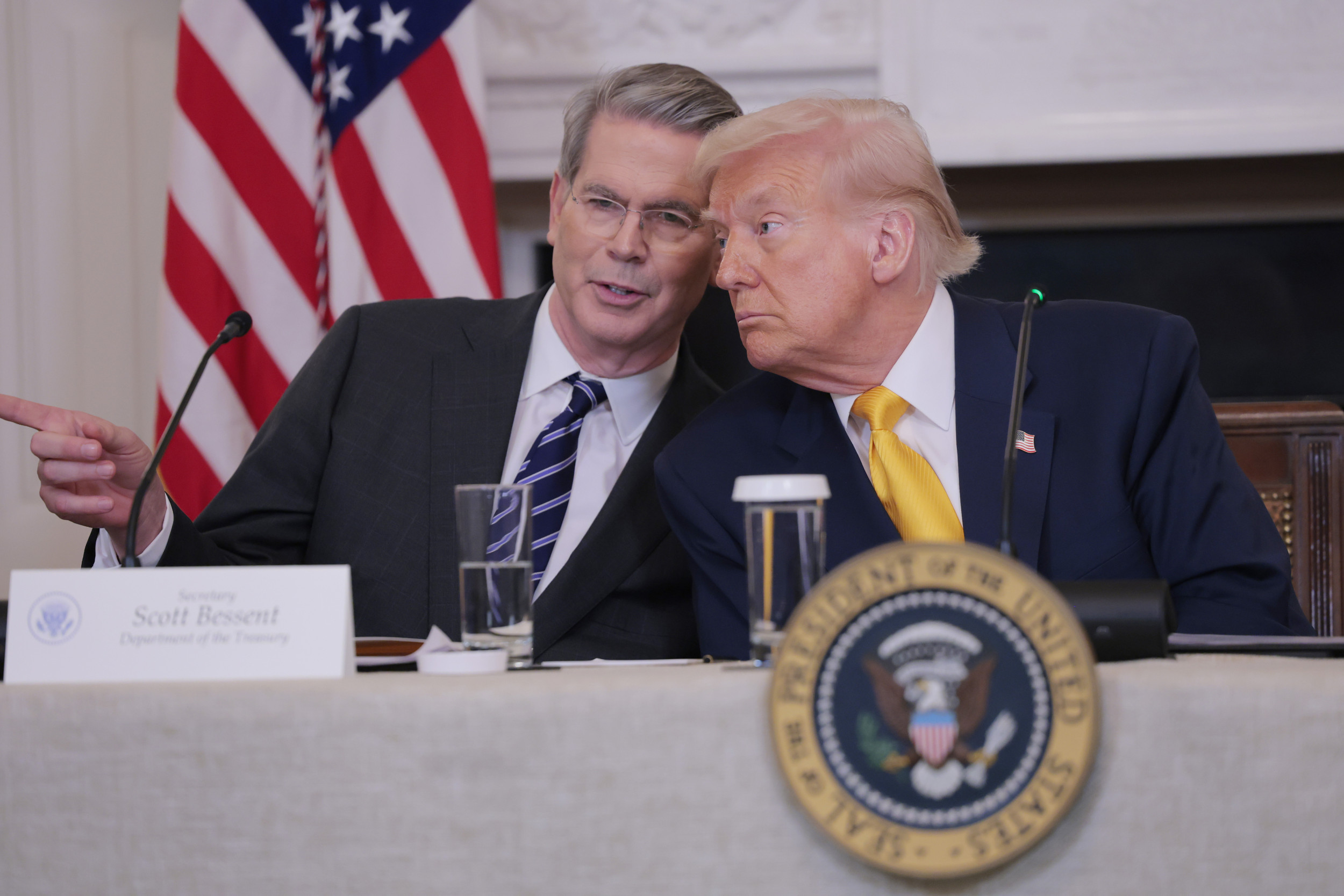President Donald Trump's sweeping new tariffs have sent global markets into a tailspin for a second straight day, but the White House is calling it a win. Officials said the president has delivered "economic prosperity," even as major indexes recorded their worst weekly losses in years, NBC News reported.
What to know:
- S&P 500 fell 6%, Nasdaq dropped 5.8%, and Dow lost over 2,200 points
- White House made no mention of market turmoil in its statement
- Trump's tariffs hit nearly 200 countries with baseline and elevated rates
- Economists warn the new tariffs could trigger a recession
- Trump insists the plan will boost U.S. strength and middle-class wealth
This live blog is now closed.
Washington and Oregon sue Trump over election overhaul order
Washington and Oregon filed a lawsuit Friday challenging Donald Trump's executive order to change how U.S. elections are run, arguing it would disenfranchise voters and violate the Constitution.
The states, that vote entirely by mail, said they would be especially impacted by Trump's new requirements, including proof of citizenship to register and a mandate that mail ballots arrive by Election Day. Washington Attorney General Nick Brown said the president has no legal authority to impose such rules.
The suit is the fifth filed against the order, which also threatens to cut federal funding for states that don't comply. Oregon Attorney General Dan Rayfield called the move "a direct assault on the Constitution."
More than 300,000 ballots in Washington were counted last year despite arriving after Election Day under current law. Trump's order could disqualify them.
The White House defended the policy as "common sense," while critics say it's part of Trump's ongoing efforts to undermine trust in elections.
Trump shares video claiming market crash is intentional amid tariff fallout
As global markets plunged for a second straight day following Trump's sweeping new tariffs, the former president posted a video on Truth Social suggesting the downturn was part of a larger plan.
The video, originally from TikTok, claims Trump is intentionally crashing the market to pressure the Federal Reserve into cutting interest rates and to push companies to build in the U.S. It also argues that the move will lower prices for consumers and shift economic benefits to the middle class.
Wall Street ended its worst week in five years, with the S&P 500 down nearly 6% and the Dow falling 5.5%. The declines followed Trump's announcement of a 10% tariff on nearly all imports, with higher rates on goods from China, Vietnam and the EU. China has already responded with matching tariffs, while the EU is weighing its options.
Despite the video's claims, Fed Chair Jerome Powell warned the tariffs could lead to higher inflation and slower growth. Trump, however, told reporters Thursday that the downturn was expected and that the economy will "boom" as a result.
Trump shares false video claiming Warren Buffett backs tariff plan

Trump on Friday shared a video on Truth Social that falsely claimed billionaire investor Warren Buffett supported his new tariff strategy, despite market turmoil and warnings of a recession.
The video's narrator praised Trump's economic moves and wrongly asserted Buffett called them the best in over 50 years. Buffett's company, Berkshire Hathaway, quickly denied the claim, calling the circulating reports "false," CNN reported.
Supreme Court allows Trump to cut $65M in DEI education grants
The Supreme Court on Friday allowed the Trump administration to cancel $65 million in education grants tied to diversity, equity, and inclusion (DEI) programs. In a 5-4 decision, the justices lifted a lower court's order that had temporarily blocked the move.
The grants supported teacher-training programs in eight Democratic-led states that sued to preserve the funding. The decision marks a key victory for Trump's broader effort to roll back DEI initiatives and reduce federal spending.
Chief Justice John Roberts joined the court's three liberal justices in dissent. The ruling is the administration's first major legal win as it pushes to end contracts and remove staff involved in DEI across multiple agencies.
Trump signs order to delay TikTok ban amid stalled China talks
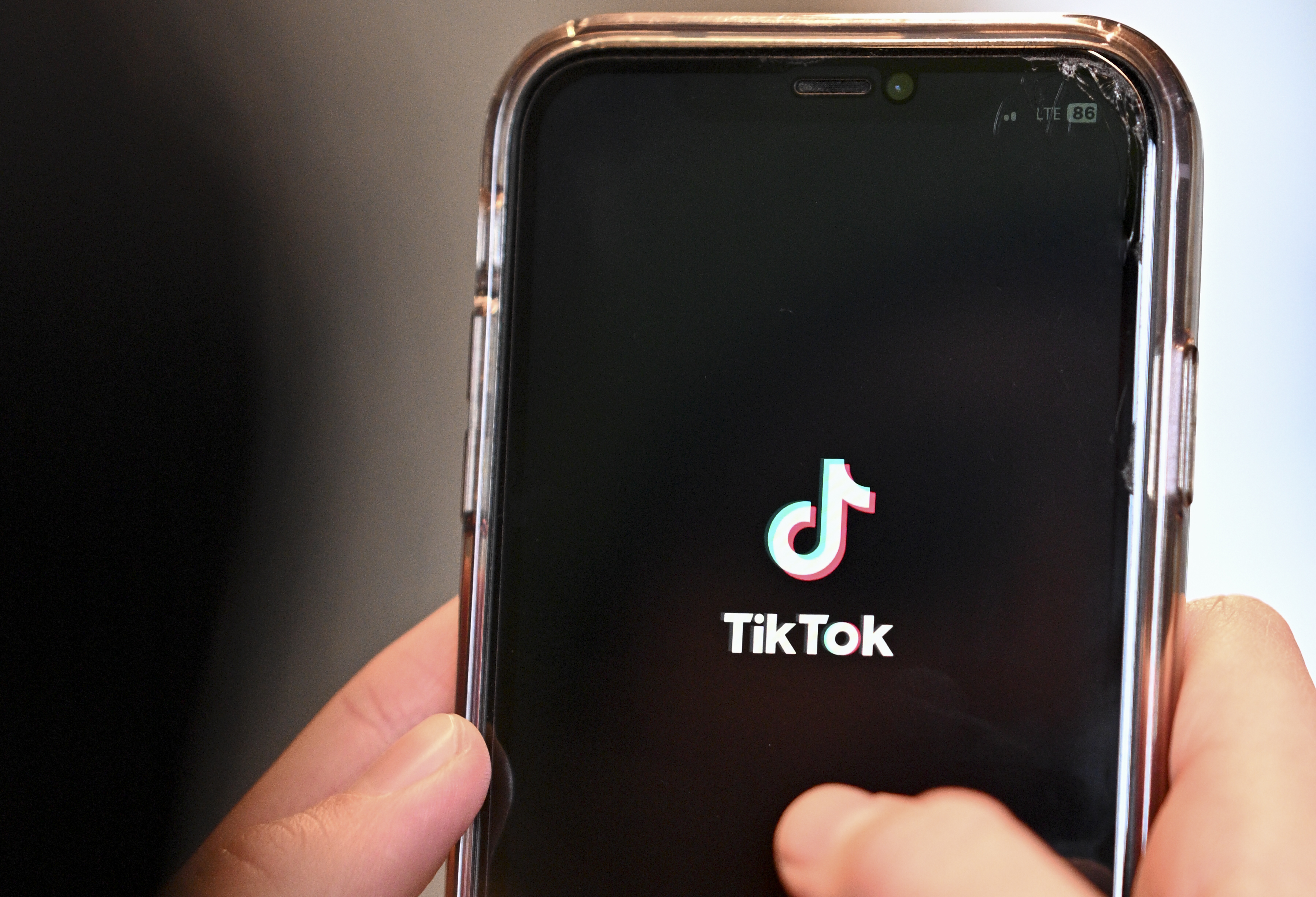
Trump signed an executive order Friday to keep TikTok operating in the U.S. for another 75 days, extending a deadline for ByteDance to divest from the platform. The move comes as a tentative deal to transfer majority ownership to American investors was thrown into doubt after China objected to Trump's newly announced global tariffs.
The White House had expected a deal soon, but ByteDance paused negotiations following Beijing's response to Trump's trade actions. Talks had been underway for months, with Vice President JD Vance's team and American investors working on a plan that would leave ByteDance with a minority stake.
Trump's extension appears to defy a law requiring TikTok's Chinese ties to be severed by January 19. Critics say the delay undermines national security and legal precedent, while others welcome the reprieve.
TikTok creators expressed frustration over continued uncertainty, saying the repeated back-and-forth has made planning difficult. The order gives the administration more time, but whether a final deal will materialize remains unclear.
Trump stays silent at Florida club as tariffs shake markets
Trump spent about six hours Friday at his Florida golf club while financial markets continued to drop in response to his new tariffs.
The White House issued a lid at 3:42 p.m. ET, meaning Trump did not make any public comments.
John Roberts sides with Supreme Court liberals against Donald Trump
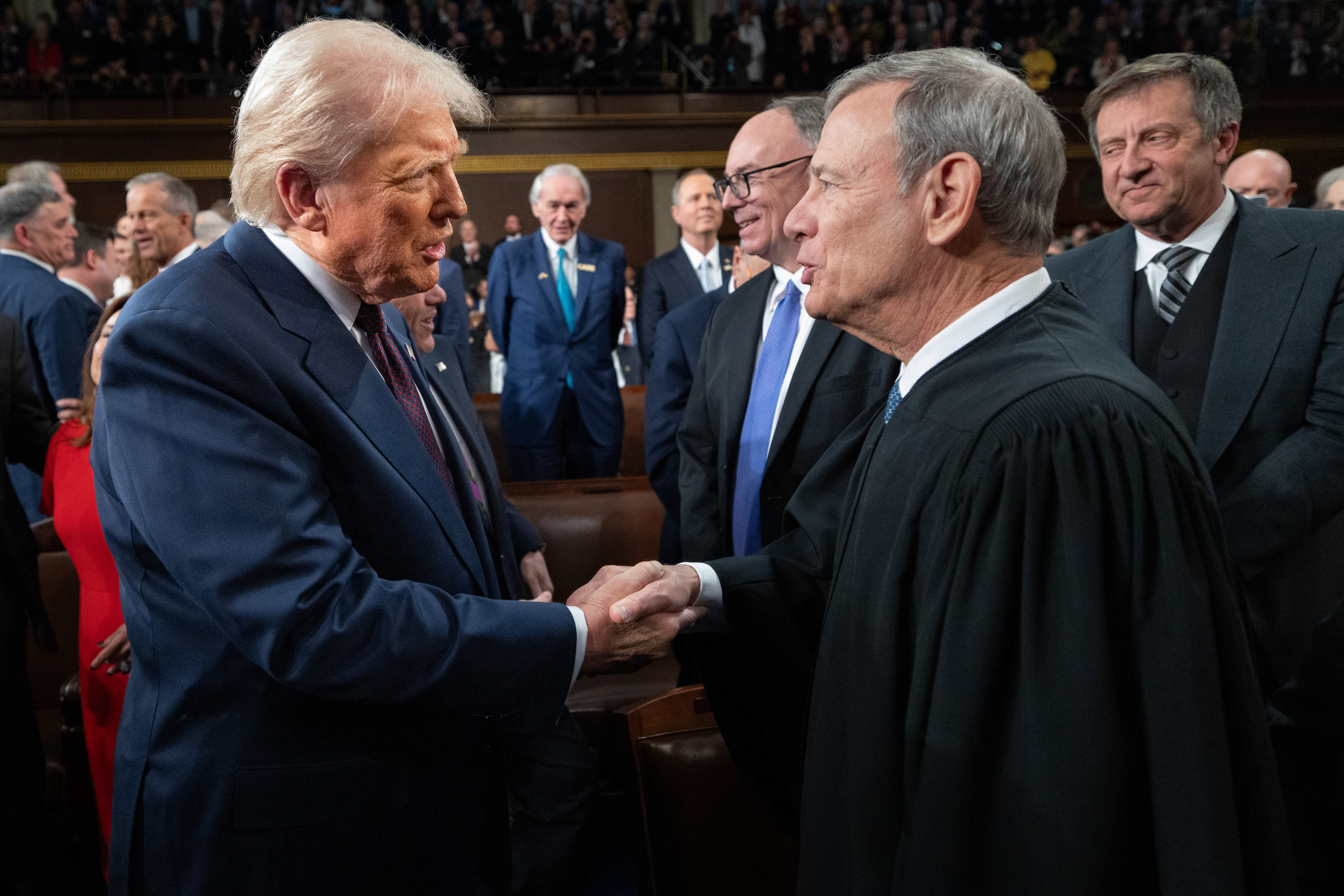
The Supreme Court on Friday sided with the Trump administration, allowing it to proceed with cutting hundreds of millions of dollars in teacher-training funds while a legal challenge continues.
The decision, a 5-4 ruling, marks a significant development in the administration's broader effort to dismantle diversity, equity, and inclusion (DEI) initiatives. Chief Justice John Roberts broke from the court's conservative majority, joining the three liberal justices in dissent.
At issue are two federal grant programs—the Teacher Quality Partnership and Supporting Effective Educator Development—which provide over $600 million annually to support teacher preparation, particularly in critical fields like math, science and special education. Eight Democratic-led states challenging the cuts argue that the programs have boosted teacher retention and helped address the national teacher shortage.
The administration halted the funding abruptly in February, without public notice. U.S. District Judge Myong Joun, appointed by President Joe Biden, temporarily blocked the move, ruling that it likely violated federal law by failing to offer a clear justification. The 1st U.S. Circuit Court of Appeals in Boston upheld the block, rejecting the Trump administration's request to lift the pause.
The Supreme Court's decision to grant the emergency appeal now allows the administration to proceed with the cuts while the case plays out. The majority reasoned that the states could continue funding the programs with their own resources in the interim and noted that the federal government likely wouldn't be able to recover the funds if it eventually prevails.
Read the full story by Gabe Whisnant and Dan Gooding on Newsweek.
Senate debates budget plan crucial for tax cuts and defense spending
The Senate engaged in a contentious debate on Friday over a budget plan that could pave the way for significant tax cuts and increased spending on border security and defense. This move is central to Republican efforts to pass a tax reform package, with the potential to secure tax cuts for most Americans, despite opposition from Democrats.
Republicans argue that the plan will prevent tax increases set to occur at the end of the year, particularly concerning individual and estate taxes. Senate Majority Leader John Thune emphasized the belief that Americans should have control over their own money, framing the bill as necessary for economic growth. However, Democrats strongly oppose the plan, warning that it could increase deficits and lead to cuts in vital programs like Medicaid and nutritional assistance.
The debate is part of a broader effort that involves a series of votes and amendments, including controversial proposals related to Trump's tariff policies. While Republicans are expected to pass the measure, the real challenge will come in developing the final bill, which may take months and require careful negotiation among party members.
The plan also includes provisions to expand deficits by up to $1.5 trillion, extend tax cuts, and increase the debt ceiling by up to $5 trillion. The budget would also provide significant funding for defense and border security, with GOP leaders aiming to secure the necessary support from lawmakers in key states.
Despite the potential for significant tax breaks, Democrats argue that the benefits will disproportionately favor the wealthy. As negotiations continue, the plan's future remains uncertain, with the need for compromise and fiscal responsibility likely to shape the final outcome.
US attorney investigates leaks during January 6th prosecutions
The acting US attorney in Washington, DC, Ed Martin, announced today that his office is investigating leaks related to the January 6th prosecutions as part of an expanded probe. The investigation follows a previous effort into prosecutors who brought obstruction charges under US Code 1512(c) against some rioters, charges that were later dismissed due to a Supreme Court ruling.
In a memo obtained by CNN, Martin stated that leaks of evidence, tactics, and other information had harmed parties, witnesses, and law enforcement officers. He also noted that these leaks were used by the media and partisans as misinformation. The memo did not specify who requested the investigation or identify any particular leaks but emphasized the broad negative impact.
Martin's office did not respond to a request for comment. He had initially asked lawyers involved in the cases related to the obstruction charges to provide related documents and correspondence.
Martin, appointed by Trump, is facing resistance from Senate Democrats, who have pledged to block his confirmation as the permanent US attorney for Washington, DC.
Trump fires NSA director without explanation, triggering backlash
Trump has abruptly fired Air Force Gen. Tim Haugh, the director of the National Security Agency (NSA) and head of the Pentagon's Cyber Command. The decision, which has drawn sharp criticism from lawmakers, came without a clear explanation from the White House or the Pentagon.
Haugh, a four-star general with a 33-year career in intelligence and cyber operations, was removed on Thursday, though senior military leaders were not notified in advance. His civilian deputy, Wendy Noble, was also dismissed. Both were informed of their firing late Wednesday, with no reasons provided.
The sudden move has sparked concerns among members of Congress, including Rep. Jim Himes, who questioned whether the decision was influenced by a fringe social media personality, Laura Loomer. Loomer had previously raised concerns about Haugh's ties to Gen. Mark Milley and the Biden administration.
Critics, including Sen. Jack Reed and Sen. Mark Warner, have warned that the firing of experienced military officials for political loyalty tests could weaken U.S. national security at a time of increasing cyber threats.
Trump has not provided comments on Haugh's dismissal, but he dismissed similar firings within his administration, stating they were standard procedure for removing individuals who do not align with his agenda. Haugh's departure begins a 60-day process that could end in his retirement, as finding a new high-level position under Trump is unlikely.
Judge orders deported Salvadoran national to be returned to U.S.

A federal judge, Paula Xinis, ruled today that Kilmar Abrego Garcia, a Salvadoran national who was mistakenly deported to El Salvador last month, must be returned to the United States. Judge Xinis directed the U.S. government to ensure his return by no later than 11:59 p.m. on April 7.
Abrego Garcia was arrested on March 12 and deported to El Salvador in what the Trump administration later acknowledged as a mistake. He had been previously identified as a gang member by local authorities, based partly on a Chicago Bulls hat and hoodie he wore, and an informant's statement.
However, his attorneys have denied the gang affiliation claim, and in 2019, he was granted protected status by an immigration judge, which barred his deportation to El Salvador. Abrego Garcia, who fled gang violence more than a decade ago, was placed in CECOT, El Salvador's infamous mega-prison.
ByteDance confirms negotiations with U.S. over TikTok deal
ByteDance, the parent company of TikTok, has acknowledged for the first time that it is in negotiations with the U.S. government regarding a plan for the popular app.
The company stated that "key matters" still need to be resolved before an agreement can be reached.
ByteDance acknowledges for the first time that it’s involved in negotiations with the U.S. government on a plan for TikTok. It says, intriguingly: “There are key matters to be resolved. Any agreement will be subject to approval under Chinese law.” pic.twitter.com/3TbDx3XqsY
— Sapna Maheshwari (@sapna) April 4, 2025
Republican unease grows over Trump's tariffs as markets falter
As stock markets falter in response to Trump's sweeping tariffs, Republicans in Congress are expressing concerns but show little willingness to challenge the president. Despite a constitutional mandate to regulate tariffs, most GOP lawmakers remain hesitant to act, focusing instead on advancing Trump's tax and spending cuts agenda.
While some Republicans, like Senate Majority Leader John Thune, have given Trump the benefit of the doubt, suggesting the tariffs may be a negotiation tactic, others, such as Senate leader Mitch McConnell, have openly criticized the strategy, calling it harmful to working families. McConnell, along with a handful of Republicans, joined Democrats in a resolution to nullify Trump's tariffs on Canada, although House Speaker Mike Johnson has shown no interest in bringing it to a vote.
The division among Republicans is clear, with younger GOP members more aligned with Trump's "America First" protectionism, hoping it will revive U.S. manufacturing. Meanwhile, others, including Sen. Chuck Grassley, have proposed a bill requiring presidents to justify tariffs to Congress. Despite some support, the idea of defying Trump directly appears to be stalled in a politically charged environment.
Democrats have sharply criticized the tariffs, accusing Trump of using them to fund his tax cuts at the expense of American families. As the situation unfolds, Republicans are caught in a delicate balancing act, wary of angering Trump while addressing the growing backlash against his trade policies.
16 state attorneys general sue over NIH grant funding disruptions
A coalition of 16 state attorneys general has filed a lawsuit against the Trump administration over delays and cancellations of research grants from the National Institutes of Health (NIH). The lawsuit, filed Friday in the U.S. District Court for Massachusetts, claims the administration has implemented a "concerted, and multi-pronged effort" to disrupt NIH's grant process, causing significant delays in approvals and widespread terminations of existing grants.
The disruptions have caused uncertainty for researchers across the nation, leading to layoffs, furloughs, and halted studies. At the University of Massachusetts Amherst, the funding issues have resulted in a nearly 30% reduction in graduate admissions and rescinded financial awards. The university alone has seen four grants terminated, and 353 applications for NIH funding, worth approximately $848 million, remain pending.
This lawsuit follows a similar one filed by the American Civil Liberties Union earlier in the week, accusing NIH of conducting an "ideological purge" of research projects. Neither NIH nor the U.S. Department of Health and Human Services immediately commented on the lawsuits.
Weather service vacancies rise under Trump-era cuts as storms batter U.S.
Nearly half of National Weather Service forecast offices now have staffing shortages exceeding 20%, double the rate from a decade ago, according to data obtained by the Associated Press. The shortfalls come as severe storms and tornadoes hit parts of the country, leaving meteorologists stretched thin.
Eight offices, including those in Arkansas and Kentucky, are missing more than 35% of their staff. Experts say vacancy rates above 20% amount to critical understaffing, and 55 of 122 offices are at or beyond that level.
The staffing gaps have already delayed tornado damage surveys and led to reduced weather balloon launches in places like Rapid City and Omaha. Several offices are also missing leadership roles key to coordinating emergency warnings.
Inside Trump Policy: The art of the tariff
Good afternoon,
President Donald Trump took the podium in the White House Rose Garden before a crowd of supporters to announce a sweeping new set of tariffs, saying: "Our country and its taxpayers have been ripped off for more than 50 years, but it is not going to happen anymore."
Holding a large chart, Trump ran down a list of reciprocal tariffs targeting dozens of countries. China was hit hard, facing a new 34% tariff on top of existing 20% rates.
"For decades, our country has been looted, pillaged, raped and plundered by nations near and far, both friend and foe alike," Trump said. "The new tariffs will raise trillions and trillions of dollars to reduce our taxes and pay down our national debt, and it'll all happen very quickly."
The reaction over the next 36 hours was swift. Thursday, global stocks slumped and U.S. stocks suffered the worst day since 2020. Then early Friday, China announced it will impose reciprocal 34% tariffs on all imports from the U.S. beginning April 10.
The baseline U.S. tariffs of 10% are set to take effect on April 5, with reciprocal tariffs following on April 9...but will they? Trump said Thursday that he would be open to negotiating with other countries for "phenomenal" offerings. We saw this happen with Canada and Mexico—Trump spoke with then-Prime Minister Justin Trudeau and President Claudia Sheinbaum, agreements were reached and tariffs were delayed.
Trump delays TikTok ban again as deal talks continue
Trump announced Friday a 75-day extension of the deadline to enforce a ban on TikTok, giving his administration more time to finalize a deal that would allow the app to remain in the U.S.
"My Administration has been working very hard on a Deal to SAVE TIKTOK," Trump said in a Truth Social post. "The Deal requires more work to ensure all necessary approvals are signed."
The delay comes just one day before the ban was set to take effect, following a previous 75-day pause when Trump first took office in January.
Schumer slams Trump tariffs as GOP calls for more dealmaking
Senate Majority Leader Chuck Schumer criticized Trump's tariffs on Friday, saying they're squeezing American families between higher costs and budget cuts. "Trump's tariffs raise costs on one side, and Trump's budget cuts rob people of health care, nutrition, Medicaid, more on the other," Schumer said.
Republicans took a more measured stance. Sen. John Barrasso of Wyoming said the administration is pursuing country-by-country talks. "The president is a dealmaker if nothing else," he said, adding that Treasury Secretary Scott Bessent told GOP senators the tariffs are meant as leverage, not a long-term fixture.
Brazil says Trump tariffs could speed up EU trade deal
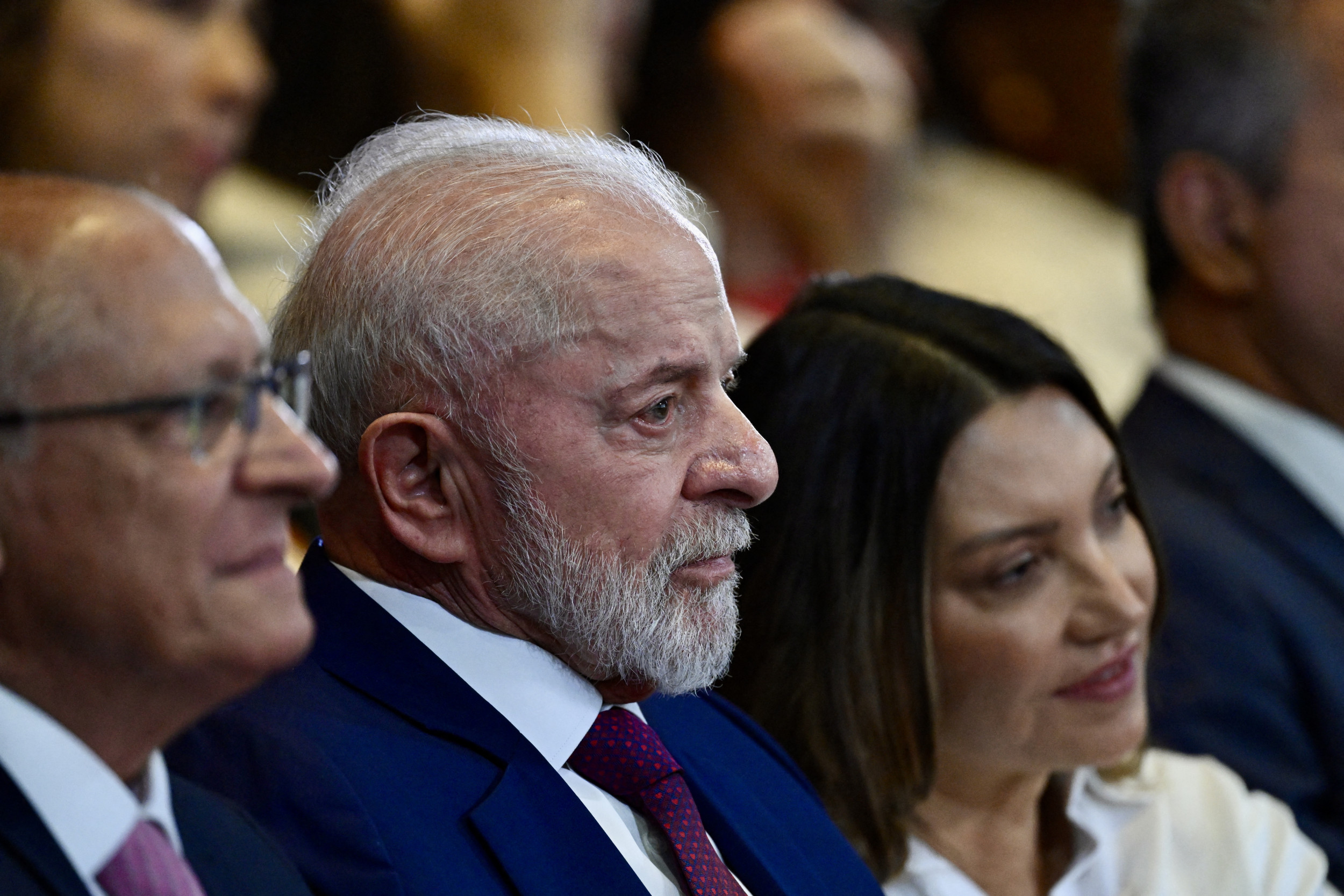
Brazilian Vice President Geraldo Alckmin said Thursday that President Trump's new tariffs could push South America and the European Union to ratify their pending trade agreement more quickly. The Mercosur–EU deal, signed in December, is still awaiting final approval from member nations.
Alckmin, who also oversees Brazil's trade ministry, told the Direto de Brasilia podcast that Brazil prefers continued negotiations over retaliation, despite having legislation in place to respond. "Even though Brazil got the lowest tariff, 10%, it's still bad," he said. "No one wins in a tariff war."
Stocks tumble as China strikes back in trade war escalation
U.S. stocks plunged Friday after China retaliated against Trump's sweeping tariffs, intensifying fears of a prolonged global trade war. The Dow Jones Industrial Average fell by 1,630 points, or 4%, while the S&P 500 and Nasdaq dropped 4.6% and 4.7% respectively.
The sell-off reflects mounting investor concern that the escalating dispute could push the U.S. and global economies toward recession. Federal Reserve Chair Jerome Powell said inflation could remain high and growth slower than expected due to the broader-than-anticipated impact of Trump's trade policies.
Newsom seeks tariff workarounds to shield California trade
California Governor Gavin Newsom is asking foreign governments to exempt California-made goods from retaliatory tariffs sparked by Trump's new trade policy. In a video and press release Friday, Newsom said Trump's tariffs don't represent the views of all Americans, particularly those in California, the fifth-largest economy in the world.
Newsom said the state's economy and rebuilding efforts—especially after January's wildfires—could be hurt by retaliatory tariffs on construction materials. California, a major exporter of agricultural goods, also relies heavily on cross-border supply chains with Mexico, Canada, and China.
While the governor did not provide details on how international trade carve-outs might work, he framed California as a stable partner. The White House responded by criticizing Newsom's priorities and California's governance.
Trump urges rate cut, but Fed says no rush
Trump renewed his calls Friday for the Federal Reserve to cut interest rates, despite inflation and slowing growth. But Fed Chair Jerome Powell said the central bank is in no hurry to act, even as markets react to Trump's sweeping tariff hikes.
Speaking at a conference, Powell said Fed economists are still evaluating the economic impact of the new trade policies. "It feels like we don't need to be in a hurry," he said, adding that it's unclear what monetary path is best.
The Fed's next policy meeting is set for the first week of May.
Klarna delays IPO plans amid market volatility tied to tariffs
Klarna is postponing its initial public offering as market uncertainty continues to rattle Wall Street, a person familiar with the matter said Friday.
The buy-now-pay-later company had planned to list its shares in the coming weeks but is now holding off.
The delay was first reported by The Wall Street Journal, and Klarna has not publicly commented on the decision.
Jerome Powell surprised by tariffs: risks higher inflation, slower growth
Federal Reserve Chair Jerome Powell warned Friday that the Trump administration's sweeping new tariffs are likely to drive up inflation and slow economic growth.
In written remarks, Powell said the economic impact of the tariffs is "significantly larger than expected" and predicted they are "highly likely" to cause at least a temporary spike in inflation—though he acknowledged the effects could prove more lasting.
"Our obligation is to ensure that a one-time increase in the price level does not evolve into a persistent inflation problem," Powell said during a speech in Arlington, Virginia.
Powell's emphasis on controlling inflation suggests the Fed is likely to hold its benchmark interest rate steady at around 4.3 percent in the near term. That stance could frustrate investors on Wall Street, many of whom had anticipated as many as five rate cuts this year—a number that has grown since President Trump announced the tariffs on Wednesday.
Economists warn the tariffs could dampen economic growth, slow hiring, and increase consumer prices. That puts the Fed in a difficult position: it could cut interest rates to support growth or keep them elevated to rein in inflation. Powell's remarks suggest the central bank will prioritize price stability, even if growth slows.
Toyota to assist U.S. suppliers with tariff-related costs

Toyota Motor's North American unit has notified local auto parts suppliers that it plans to help offset rising costs tied to new U.S. tariffs, according to Nikkei.
The support comes as the Trump administration imposes a 25% tariff on all imported vehicles, with additional duties on key components like engines and transmissions set to take effect May 3. Toyota's move aims to ease the burden on domestic suppliers as the industry adjusts to the new trade policy.
GM to boost pickup truck production at Indiana plant amid tariff concerns
General Motors said Friday it will ramp up production at its Fort Wayne, Indiana plant in response to new U.S. tariffs on imported vehicles. The facility builds the Chevrolet Silverado and GMC Sierra, two of GM's most profitable models.
The move is aimed at reducing reliance on imports from Mexico and Canada. "General Motors will be making operational adjustments at Wayne Assembly, including hiring temporary employees, to support manufacturing and business needs," the company said in a statement.
The announcement comes days after the Trump administration introduced new tariffs targeting foreign-made vehicles and parts.
Trump urges Fed chair to cut interest rates, says inflation is down
Trump on Friday called on Federal Reserve Chair Jerome Powell to cut interest rates, accusing him of playing politics by waiting too long to act.
Nintendo delays Switch 2 preorders in U.S. over tariff concerns

Nintendo has postponed U.S. preorders for its upcoming Switch 2 console, citing uncertainty over new tariffs introduced by the Trump administration. Preorders were originally set to begin April 9.
In a statement, the company said it is assessing "the potential impact of tariffs and evolving market conditions," and will announce a new preorder date later. The console's launch date of June 5, 2025, remains unchanged.
The delay comes just after President Trump announced new tariffs on foreign goods, with a focus on Asian supply chains—where Nintendo's manufacturing is centered. The Switch is currently the third-bestselling console globally.
NEH staff placed on leave as grants are canceled
Staff members at the National Endowment for the Humanities (NEH) have begun receiving notices placing them on administrative leave, according to two officials familiar with the matter. The total number of affected employees remains unclear.
The NEH, which funds educational and cultural programs across the country, has also notified some grant recipients that their funding has been canceled. The agency did not immediately respond to a request for comment Friday.
The developments come amid broader cutbacks to cultural institutions under the Trump administration, including reductions at the Kennedy Center, the Institute of Museum and Library Services, and the Smithsonian.
Colleges alarmed by student visa crackdown under Trump administration
U.S. colleges are raising alarms over a wave of student visa revocations, which they say marks a dramatic shift in immigration enforcement. Officials say foreign students are being ordered to leave the country without warning, often bypassing schools entirely and offering little explanation.
At several campuses, including Arizona State, Cornell, and North Carolina State, students have lost legal status suddenly — sometimes over minor infractions or alleged political activity. Some have been detained, others have quietly left.
At Minnesota State University in Mankato, five students were flagged in a federal database after the arrest of another student in Minneapolis. In many cases, schools were unaware of any issues until after the fact.
Secretary of State Marco Rubio recently confirmed that students tied to protests or criminal records are being targeted. However, advocacy groups say many are being punished retroactively or for vague reasons, raising First Amendment concerns.
University leaders warn the crackdown could discourage international students from coming to the U.S., threatening both academic exchange and vital tuition revenue.
Rubio dismisses travel concerns, presses Russia on peace talks

Secretary of State Marco Rubio on Friday dismissed worries that international visitors risk being detained in the U.S., saying such fears are unfounded unless travelers aim to provoke unrest.
Speaking in Brussels, Rubio said, "If you're not coming to the United States to join a Hamas protest... then you have nothing to worry about."
On Ukraine, Rubio said the U.S. expects to know "in weeks" whether Russia is serious about peace. He noted a meeting with Russian negotiator Kirill Dmitriev and said, "Ultimately, Putin has to decide."
Rubio also defended the U.S. earthquake response in Myanmar, saying the junta would have blocked help regardless and that America's humanitarian aid remains strong.
Senate prepares for voting marathon on GOP budget plan
The Senate is bracing for a lengthy session as lawmakers from both parties prepare to introduce a flurry of amendments to the Republican budget resolution.
Democrats plan to use the process to go after former President Donald Trump's agenda. Senate Minority Leader Chuck Schumer said they'll focus on issues like Medicaid cuts, tax breaks for the wealthy, tariffs, veterans' care, national security, and what he described as corruption tied to Trump.
The resolution sets the stage for steep tax cuts, higher spending on defense and immigration enforcement, and a $5 trillion increase to the debt limit. While nonbinding, it directs committees to draft legislation based on its priorities, paving the way for possible new laws.
Schumer called the plan "poison" and said Democrats will use the session to highlight its impact on Americans' health, finances, and future.
Global scramble as countries respond to Trump's sweeping tariffs
Nations around the world are reacting swiftly to new U.S. tariffs announced by President Donald Trump, setting off a wave of retaliation, trade talks and economic warnings.
China took the most aggressive stance, matching the U.S. 34% tariff on Chinese imports with an identical tariff on all American goods, effective April 10. Beijing also imposed new export controls on rare earth elements and suspended poultry imports from two U.S. firms.
Trump defended the tariffs as a wealth-building opportunity, saying on social media, "My policies will never change. This is a great time to get rich."
Other countries struck a range of tones. Taiwan pledged support for its industries hit by tariffs. India began exploring trade opportunities and potential deals. The EU, while criticizing the U.S. move, said it's open to negotiation. Meanwhile, Japan's prime minister offered to travel to Washington for last-minute talks, and Vietnam announced its deputy prime minister would visit the U.S. to ease tensions.
China also filed a formal complaint with the World Trade Organization, accusing the U.S. of undermining the global economic system. Analysts warned the dispute could deepen global divisions, while some countries—including China—said they would now look to expand trade with partners outside the U.S.
As pressure mounts, several governments are working on domestic relief for industries facing new tariffs, with leaders stressing the importance of communication, resilience, and long-term adaptation.
Trump reacts to China's huge retaliatory tariffs on US
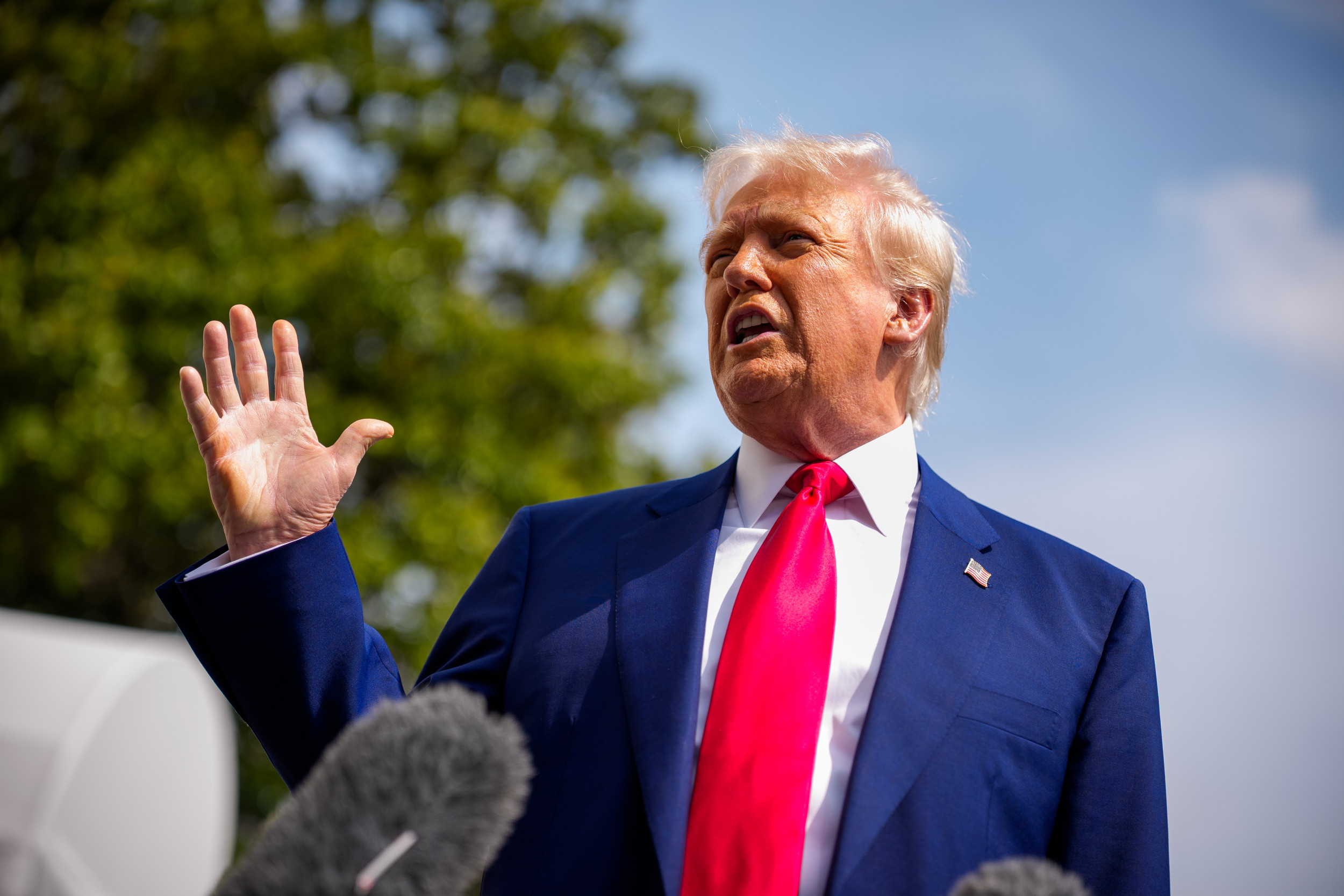
President Donald Trump said China has "panicked" in its retaliation to his tariffs, saying Beijing has "played it wrong".
The Chinese finance ministry said on Friday it would impose a 34% additional tariff on all U.S. imports from April 10.
Trump had unveiled a 34% additional tariff on Chinese imports on Wednesday.
"CHINA PLAYED IT WRONG, THEY PANICKED - THE ONE THING THEY CANNOT AFFORD TO DO!" Trump wrote on his Truth Social platform on Friday morning.
The stock markets have opened sharply down on Friday morning in response to the unfolding trade war, extending Thursday's losses.
To read how Newsweek uses AI as a newsroom tool, Click here.
